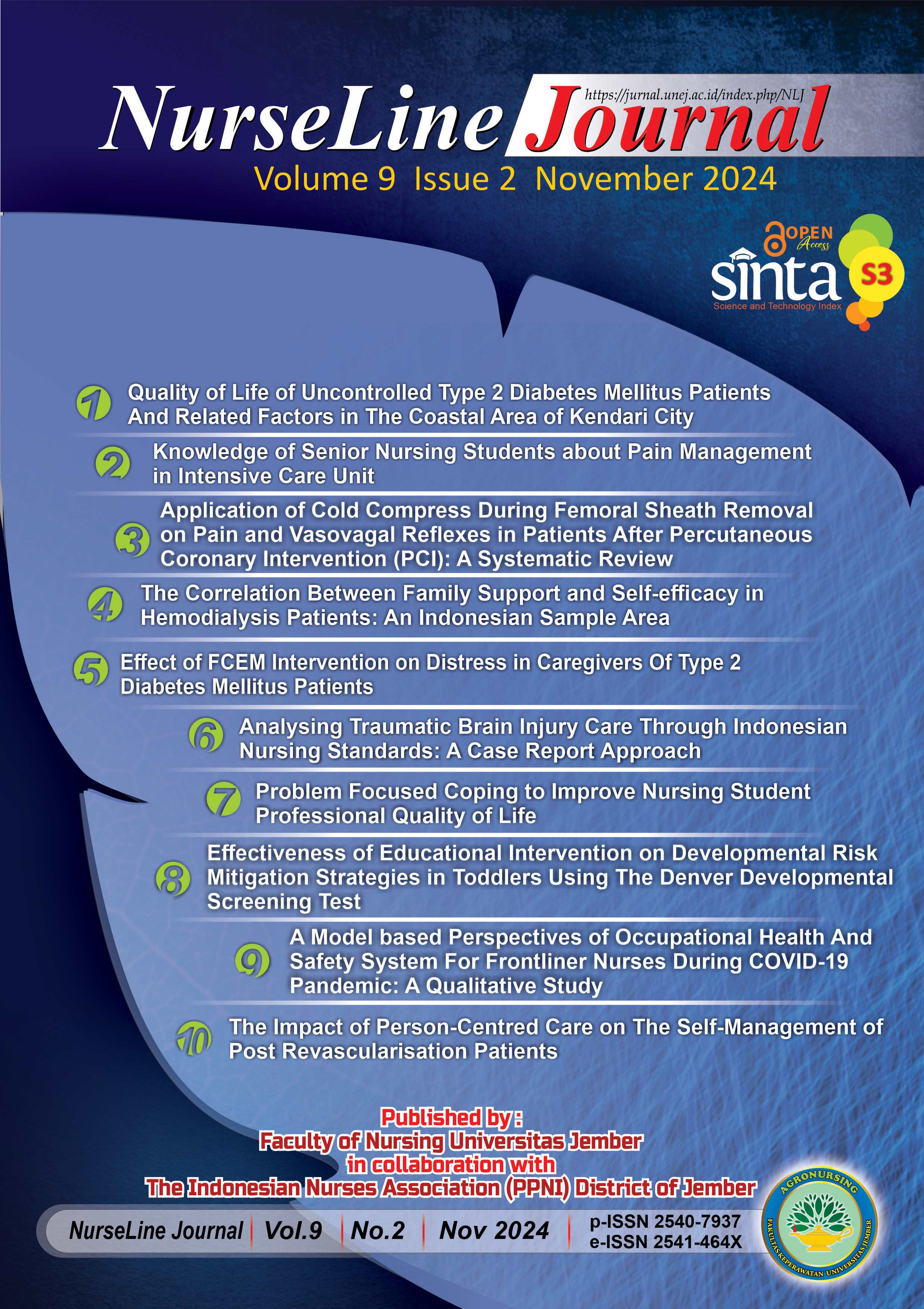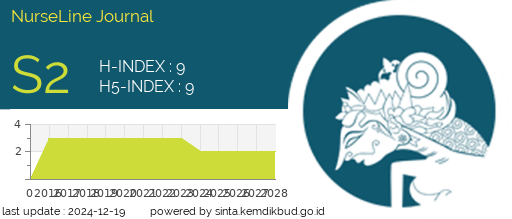Problem Focused Coping to Improve Nursing Student Professional Quality of Life
DOI:
https://doi.org/10.19184/nlj.v9i2.52512Keywords:
Problem-Focused Coping Strategy, Professional Quality of Life, Nurse Professional StudentAbstract
Clinical stressors can influence student’s professional quality of life. Problem-focused coping strategy is one type of coping strategy that can affect the quality of professional life. The research analyzes the relationship between problem-focused coping strategies and nursing students' professional quality of life. This study used a correlational analytic design with a cross-sectional approach. 132 professional nursing students were recruited using the technique of proportionate stratified random sampling. Data were collected using the Professional Quality of Life Scale 5th version and Questionnaire Problem-Focused Coping and analyzed by Spearman Correlation Test with a significance level of 0.05. The research results showed that the respondents exhibit low problem-focused coping strategies (50.8%) and a high professional quality of life (50.8%). Both variables show a weak positive unidirectional correlation (p-value=0.001; r = 0.281). The better the use of problem-focused coping, the better the quality of professional life. Problem-focused coping strategies positively correlate with improved compassion satisfaction as a positive aspect of professional quality of life. The weak relationship between both variables is assumed because of the complex clinical environment, and problem-focused coping can be only a moderating factor. Educators and nurses need to optimize clinical learning conditions and monitor burnout and stress in clinical practice. Thus, training and intensifying the problem-focused coping strategy is recommended to improve students' professional lives.
Downloads
Download data is not yet available.
References
’Azima, M.F., Dewi, W.N., Novayelinda, R., 2022. Persepsi Mahasiswa Profesi Ners terhadap Pelaksanaan Profesi Ners Secara Daring di Fakultas Keperawatan Universitas Riau. J. Ners Indones. 12, 170–176. https://doi.org/10.55784/jkj.vol1.iss1.128
Afandi, A.T., Ardiana, A., 2021. Exploration of the Non-Physical Work Environment and Burnout Syndrome for Nurses at the Jember Regional Hospital. Pakistan J. Med. Heal. Sci. 15, 256–259.
Agustiningsih, N., 2019. Gambaran Stress Akademik dan Strategi Koping pada Mahasiswa Keperawatan. J. Ners dan Kebidanan (Journal Ners Midwifery) 6, 241–250. https://doi.org/10.26699/jnk.v6i2.art.p241-250
AIPNI, 2021. Kurikulum Pendidikan Ners Indonesia Tahun 2021. AIPNI, Jakarta.
Al Barmawi, M.A., Subih, M., Salameh, O., Sayyah Yousef Sayyah, N., Shoqirat, N., Abdel-Azeez Eid Abu Jebbeh, R., 2019. Coping Strategies as Moderating Factors to Compassion Fatigue among Critical Care Nurses. Brain Behav. 9, 1–8. https://doi.org/10.1002/brb3.1264
Alfikalia, 2017. Keterlibatan Orang Tua dalam Pendidikan Mahasiswa di Perguruan Tinggi. Inq. J. Ilm. Psikol. 8, 42–54.
Ariviana, I.S., Wuryaningsih, E.W., Kurniyawan, E.H., 2021. Tingkat Stres, Ansietas, dan Depresi Mahasiswa Profesi Ners di Masa Pandemi Covid-19. J. Ilmu Keperawatan Jiwa 4, 741–752.
Aufar, F.N., Purwandari, R., Kurniawan, D.E., 2021. Lingkungan Belajar Klinik di Rumah Sakit: Asesmen pada Mahasiswa Profesi Ners. J. Ilmu Keperawatan J. Nurs. Sci. 9, 46–54.
Azizah, S.N., Putrianti, F.G., 2018. Interaksi Sosial dengan Burnout Pada Karyawan PT. Dasar Karya Utama. J. Spirits 8, 18–31.
Baluwa, M.A., Lazaro, M., Mhango, L., Msiska, G., 2021. Stress and Coping Strategies among Malawian Undergraduate Nursing Students. Adv. Med. Educ. Pract. 12, 547–556. https://doi.org/10.2147/AMEP.S300457
Cao, X., Wang, L., Wei, S., Li, J., Gong, S., 2021. Prevalence and Predictors for Compassion Fatigue and Compassion Satisfaction in Nursing Students during Clinical Placement. Nurse Educ. Pract. 51, 1–7. https://doi.org/10.1016/j.nepr.2021.102999
Deniati, K., Anugrahwati, R., Suminarti, T., 2018. Pengaruh Berfikir Kritis terhadap Kemampuan Perawat Pelaksana dalam Melakukan Asuhan Keperawatan di Rumah Sakit Hermina Bekasi Tahun 2016. J. Kesehat. Holistik 12, 21–25.
Eka, N.G.A., Tahulending, P., 2018. Professional Quality of Life as Perceived by New Graduate Nurses. KnE Life Sci. 4, 272–278. https://doi.org/10.18502/kls.v4i1.1389
Embuai, S., Siauta, M., Tuasikal, H., 2018. Hubungan Diabetes Self Care Terhadap Risiko Foot Ulcer pada Klien Diabetes Melitus. J. Heal. Sci. Prev. 2, 83–87.
Fernandez-Parsons, R., Rodriguez, L., Goyal, D., 2013. Moral Distress in Emergency Nurses. J. Emerg. Nurs. 39, 547–552. https://doi.org/10.1016/j.jen.2012.12.009
Folkman, S., 1984. Personal Control and Stress and Coping Processes: A Theoretical Analysis. J. Pers. Soc. Psychol. 46, 839–852. https://doi.org/10.1037/0022-3514.46.4.839
Fujianti, M.E.Y., Wuryaningsih, E.W., Hadi, E., 2020. Relationship between Workload with the Professional Quality of Life of Community Health Nursing in the Health Center Agriculture Area of Jember. J. Keperawatan 11, 168–183.
Handini, F.S., Patarru’, F., Weu, B.Y., Heryyanoor, Purwanza, S.W., 2019. Factors that Influence Professional Quality of Life (Pro-QOL) on Clinical Nurses: Systematic Review. J. Ners 14, 393–396.
Haryono, R.H.S., Kurniasari, K., 2018. Stres Akademis Berhubungan dengan Kualitas Hidup pada Remaja. J. Biomedika dan Kesehat. 1, 75–84. https://doi.org/10.18051/jbiomedkes.2018.v1.75-84
Hashish, E.A.A., Atalla, A.D.G., 2023. The Relationship between Coping Strategies, Compassion Satisfaction, and Compassion Fatigue During the COVID-19 Pandemic. SAGE Open Nurs. 9, 1–11. https://doi.org/10.1177/23779608231160463
Hendriani, W., 2019. Resiliensi Psikologis: Sebuah Pengantar, 1st ed. Prenadamedia Group, Jakarta.
Hidayati, S., Amalia, R., Aiyub, 2022. Burnout Mahasiswa Keperawatan dalam Mengikuti Program Profesi Ners di Masa Pandemi Covid-19. JIM FKep 5, 9–15.
Hwang, E., Kim, M., Shin, S., 2021. Initial Clinical Practicum Stress Among Nursing Students: A Cross-sectional Study on coping Styles. Int. J. Environ. Res. Public Health 18, 1–9. https://doi.org/10.3390/ijerph18094932
Jack, K., 2017. The meaning of compassion fatigue to student nurses: an interpretive phenomenological study. J. Compassionate Heal. Care 4, 1–8. https://doi.org/10.1186/s40639-017-0031-5
Kereh, H.F., Rochmawati, E., 2022. Pengalaman Belajar Mahasiswa Keperawatan dalam Praktik Klinik. J. Telenursing 4, 1–23.
Khanastren, N., 2018. Hubungan antara Strategi Problem-focused Coping dan Kualitas Hidup pada Orangtua yang Memiliki Anak Tunadaksa. Skripsi.
Kurniawan, D., 2020. Faktor yang Mempengaruhi Terjadinya Kesenjangan antara Pengetahuan dan Praktik Klinik Mahasiswa Keperawatan di Rumah Sakit. Borneo Nurs. J. 2, 31–38.
Labrague, L.J., McEnroe-Petitte, D.M., De Los Santos, J.A.A., Edet, O.B., 2018. Examining Stress Perceptions and Coping Strategies among Saudi Nursing Students: A Systematic Review. Nurse Educ. Today 65, 192–200. https://doi.org/10.1016/j.nedt.2018.03.012
Larasati, S., 2018. Manajemen Sumber Daya Manusia, 1st ed. Deepublish, Yogyakarta.
Mansour, A.-H., Gemeay, E.M., Mansour, E.A., Albarrak, M., 2016. Professional Quality of Life as Perceived By Nursing Students at King Saud University in Riyadh. IOSR J. Nurs. Heal. Sci. 5, 48–53. https://doi.org/10.9790/1959-05224853
Marlina, T.T., 2017. Perilaku Mahasiswa dalam Pembelajaran Praktik Klinik Keperawatan Anak. J. Keperawatan Notokusumo 5, 24–35.
Matindas, V.I., 2016. Kualitas Hidup Profesional Mahasiswa Keperawatan Entry to Practice 2014 Fakultas Keperawatan Universitas Pelita Harapan: Studi Kuantitatif. Skripsi. Tangerang, Fakultas Keperawatan dan Ilmu Kesehatan UPH.
Notarnicola, I., Stievano, A., Di Gregorio, R., Trullo, R., Appolloni, P., Polletta, A.G., Caputo, R., Cirulli, G., Di Mastrantonio, C., Mechelli, E., Piccolo, C.G., Proietti, M.G., 2020. The Role of Coping Styles and Stressors on Professional Quality of Life (Pro-QoL) among in a Health Emergency Operating Center Workers: a Preliminary Cross-sectional Study. Prof. Inferm. 73, 306–313.
Nurjaman, M.F., Susilaningsih, F.S., Permana, R.H., 2023. Kualitas Hidup pada Mahasiswa Profesi Fakultas Keperawatan Universitas Padjajaran. Jurnal Ilmiah Kesehran. 18, 51-62.
Nursadrina, A.N., Andriani, D., 2020. Gambaran Coping Strategies pada Mahasiswa Universitas Padjadjaran. J. Psychol. Perspect. 2, 01–11. https://doi.org/10.47679/jopp.021.06200001
Nursalam, 2020. Metodologi Penelitian Ilmu Keperawatan:Pendekatan Praktis, Edisi 5. ed. Salemba Medika, Jakarta.
Oktorullah, Pratiwi, S.H., Setyorini, D., Permana, R.H., 2020. Nurscope: Jurnal Penelitian dan Pemikiran Ilmiah Keperawatan. 6, 66-73.
Pitaloka, L.C.T., Mamahit, H.C., 2021. Problem-Focused Coping pada Mahasiswa Aktif Fakultas Pendidikan dan Bahasa Universitas Katolik Indonesia Atma Jaya Jakarta. JKI (Jurnal Konseling Indones. 6, 41–49.
Purwandari, R., Afandi, A.T., Ayu Riski Imani, D., 2022. The Relationship between Burnout Syndrome and Nurse Organizational Commitment at Hospital. NurseLine J. 7, 118. https://doi.org/10.19184/nlj.v7i2.31034
Putri, A.F., 2018. Pentingnya Orang Dewasa Awal Menyelesaikan Tugas Perkembangannya. SCHOULID Indones. J. Sch. Couns. 3, 35–40. https://doi.org/10.23916/08430011
Putri, P., Maurida, N., Novitasari, F., Rosalina, W., Afandi, A.T., 2020. Self-Motivation and Social Support with Burnout Syndrome in Students who Completed Undergraduate Thesis. Pakistan J. Med. Heal. Sci. 14, 1322–13243.
Rafati, F., Nouhi, E., Sabzevari, S., Dehghan-Nayeri, N., 2017. Coping Strategies of Nursing Students for Dealing with Stress in Clinical Setting: A Qualitative Study. Electron. physician 9, 6120–6128.
Rahim, H.A., Irwansyah, I., 2021. Diferensiasi Peran Perawat Laki-Laki dan Perempuan di RSUD Haji Kota Makassar. Univ. Negeri Makassar.
Sacco, T.L., Copel, L.C., 2017. Compassion Satisfaction: A Concept Analysis in Nursing. Nurs. Forum 1–8. https://doi.org/10.1111/nuf.12213
Sari, D.A.D.C.Y., Wijaya, D., Purwandari, R., 2017. The Correlation of Student Perceptions About Nursing Profession with Motivation to Continuing Professional Education at School of Nursing University of Jember. e-Jurnal Pustaka Kesehat. 5, 505–512.
Sugiyono, 2021. Metode Penelitian Kuantitatif Kualitatif dan R&D, 2nd ed. Alfabeta, Bandung.
Turner, K., McCarthy, V.L., 2016. Stress and Anxiety among Nursing Students: A Review of Intervention Strategies in Literature between 2009 and 2015. Nurse Educ. Pract. 22, 21–29. https://doi.org/10.1016/j.nepr.2016.11.002.
Wati, D.S.I., Arifiana, I.Y., 2021. Dapatkah Dukungan Sosial menjadi Prediktor Strategi Coping Berfokus pada Masalah pada Mahasiswa ? Inn. J. Psychol. Res. 1, 42–51.
Wijianti, D.K.A., Purwaningtyas, F.D., 2021. Coping Stres, Resiliensi pada Mahasiswa Tingkat Akhir. PSIKOWIPA (Psikologi Wijaya Putra) 1, 11–17. https://doi.org/10.38156/psikowipa.v1i2.35
Yılmaz, G., 2018. Professional Quality of Life in Nurses: Compassion Satisfaction and Compassion Fatigue. J. Psychiatr. Nurs. 9, 205–2011. https://doi.org/10.14744/phd.2018.86648
Zhang, Y., Peters, A., Bradstreet, J., 2017. Relationships among Sleep Quality, Coping Styles, and Depressive Symptoms among College Nursing Students: A Multiple Mediator Model. J. Prof. Nurs. 34, 1–6. https://doi.org/10.1016/j.profnurs.2017.12.004
Afandi, A.T., Ardiana, A., 2021. Exploration of the Non-Physical Work Environment and Burnout Syndrome for Nurses at the Jember Regional Hospital. Pakistan J. Med. Heal. Sci. 15, 256–259.
Agustiningsih, N., 2019. Gambaran Stress Akademik dan Strategi Koping pada Mahasiswa Keperawatan. J. Ners dan Kebidanan (Journal Ners Midwifery) 6, 241–250. https://doi.org/10.26699/jnk.v6i2.art.p241-250
AIPNI, 2021. Kurikulum Pendidikan Ners Indonesia Tahun 2021. AIPNI, Jakarta.
Al Barmawi, M.A., Subih, M., Salameh, O., Sayyah Yousef Sayyah, N., Shoqirat, N., Abdel-Azeez Eid Abu Jebbeh, R., 2019. Coping Strategies as Moderating Factors to Compassion Fatigue among Critical Care Nurses. Brain Behav. 9, 1–8. https://doi.org/10.1002/brb3.1264
Alfikalia, 2017. Keterlibatan Orang Tua dalam Pendidikan Mahasiswa di Perguruan Tinggi. Inq. J. Ilm. Psikol. 8, 42–54.
Ariviana, I.S., Wuryaningsih, E.W., Kurniyawan, E.H., 2021. Tingkat Stres, Ansietas, dan Depresi Mahasiswa Profesi Ners di Masa Pandemi Covid-19. J. Ilmu Keperawatan Jiwa 4, 741–752.
Aufar, F.N., Purwandari, R., Kurniawan, D.E., 2021. Lingkungan Belajar Klinik di Rumah Sakit: Asesmen pada Mahasiswa Profesi Ners. J. Ilmu Keperawatan J. Nurs. Sci. 9, 46–54.
Azizah, S.N., Putrianti, F.G., 2018. Interaksi Sosial dengan Burnout Pada Karyawan PT. Dasar Karya Utama. J. Spirits 8, 18–31.
Baluwa, M.A., Lazaro, M., Mhango, L., Msiska, G., 2021. Stress and Coping Strategies among Malawian Undergraduate Nursing Students. Adv. Med. Educ. Pract. 12, 547–556. https://doi.org/10.2147/AMEP.S300457
Cao, X., Wang, L., Wei, S., Li, J., Gong, S., 2021. Prevalence and Predictors for Compassion Fatigue and Compassion Satisfaction in Nursing Students during Clinical Placement. Nurse Educ. Pract. 51, 1–7. https://doi.org/10.1016/j.nepr.2021.102999
Deniati, K., Anugrahwati, R., Suminarti, T., 2018. Pengaruh Berfikir Kritis terhadap Kemampuan Perawat Pelaksana dalam Melakukan Asuhan Keperawatan di Rumah Sakit Hermina Bekasi Tahun 2016. J. Kesehat. Holistik 12, 21–25.
Eka, N.G.A., Tahulending, P., 2018. Professional Quality of Life as Perceived by New Graduate Nurses. KnE Life Sci. 4, 272–278. https://doi.org/10.18502/kls.v4i1.1389
Embuai, S., Siauta, M., Tuasikal, H., 2018. Hubungan Diabetes Self Care Terhadap Risiko Foot Ulcer pada Klien Diabetes Melitus. J. Heal. Sci. Prev. 2, 83–87.
Fernandez-Parsons, R., Rodriguez, L., Goyal, D., 2013. Moral Distress in Emergency Nurses. J. Emerg. Nurs. 39, 547–552. https://doi.org/10.1016/j.jen.2012.12.009
Folkman, S., 1984. Personal Control and Stress and Coping Processes: A Theoretical Analysis. J. Pers. Soc. Psychol. 46, 839–852. https://doi.org/10.1037/0022-3514.46.4.839
Fujianti, M.E.Y., Wuryaningsih, E.W., Hadi, E., 2020. Relationship between Workload with the Professional Quality of Life of Community Health Nursing in the Health Center Agriculture Area of Jember. J. Keperawatan 11, 168–183.
Handini, F.S., Patarru’, F., Weu, B.Y., Heryyanoor, Purwanza, S.W., 2019. Factors that Influence Professional Quality of Life (Pro-QOL) on Clinical Nurses: Systematic Review. J. Ners 14, 393–396.
Haryono, R.H.S., Kurniasari, K., 2018. Stres Akademis Berhubungan dengan Kualitas Hidup pada Remaja. J. Biomedika dan Kesehat. 1, 75–84. https://doi.org/10.18051/jbiomedkes.2018.v1.75-84
Hashish, E.A.A., Atalla, A.D.G., 2023. The Relationship between Coping Strategies, Compassion Satisfaction, and Compassion Fatigue During the COVID-19 Pandemic. SAGE Open Nurs. 9, 1–11. https://doi.org/10.1177/23779608231160463
Hendriani, W., 2019. Resiliensi Psikologis: Sebuah Pengantar, 1st ed. Prenadamedia Group, Jakarta.
Hidayati, S., Amalia, R., Aiyub, 2022. Burnout Mahasiswa Keperawatan dalam Mengikuti Program Profesi Ners di Masa Pandemi Covid-19. JIM FKep 5, 9–15.
Hwang, E., Kim, M., Shin, S., 2021. Initial Clinical Practicum Stress Among Nursing Students: A Cross-sectional Study on coping Styles. Int. J. Environ. Res. Public Health 18, 1–9. https://doi.org/10.3390/ijerph18094932
Jack, K., 2017. The meaning of compassion fatigue to student nurses: an interpretive phenomenological study. J. Compassionate Heal. Care 4, 1–8. https://doi.org/10.1186/s40639-017-0031-5
Kereh, H.F., Rochmawati, E., 2022. Pengalaman Belajar Mahasiswa Keperawatan dalam Praktik Klinik. J. Telenursing 4, 1–23.
Khanastren, N., 2018. Hubungan antara Strategi Problem-focused Coping dan Kualitas Hidup pada Orangtua yang Memiliki Anak Tunadaksa. Skripsi.
Kurniawan, D., 2020. Faktor yang Mempengaruhi Terjadinya Kesenjangan antara Pengetahuan dan Praktik Klinik Mahasiswa Keperawatan di Rumah Sakit. Borneo Nurs. J. 2, 31–38.
Labrague, L.J., McEnroe-Petitte, D.M., De Los Santos, J.A.A., Edet, O.B., 2018. Examining Stress Perceptions and Coping Strategies among Saudi Nursing Students: A Systematic Review. Nurse Educ. Today 65, 192–200. https://doi.org/10.1016/j.nedt.2018.03.012
Larasati, S., 2018. Manajemen Sumber Daya Manusia, 1st ed. Deepublish, Yogyakarta.
Mansour, A.-H., Gemeay, E.M., Mansour, E.A., Albarrak, M., 2016. Professional Quality of Life as Perceived By Nursing Students at King Saud University in Riyadh. IOSR J. Nurs. Heal. Sci. 5, 48–53. https://doi.org/10.9790/1959-05224853
Marlina, T.T., 2017. Perilaku Mahasiswa dalam Pembelajaran Praktik Klinik Keperawatan Anak. J. Keperawatan Notokusumo 5, 24–35.
Matindas, V.I., 2016. Kualitas Hidup Profesional Mahasiswa Keperawatan Entry to Practice 2014 Fakultas Keperawatan Universitas Pelita Harapan: Studi Kuantitatif. Skripsi. Tangerang, Fakultas Keperawatan dan Ilmu Kesehatan UPH.
Notarnicola, I., Stievano, A., Di Gregorio, R., Trullo, R., Appolloni, P., Polletta, A.G., Caputo, R., Cirulli, G., Di Mastrantonio, C., Mechelli, E., Piccolo, C.G., Proietti, M.G., 2020. The Role of Coping Styles and Stressors on Professional Quality of Life (Pro-QoL) among in a Health Emergency Operating Center Workers: a Preliminary Cross-sectional Study. Prof. Inferm. 73, 306–313.
Nurjaman, M.F., Susilaningsih, F.S., Permana, R.H., 2023. Kualitas Hidup pada Mahasiswa Profesi Fakultas Keperawatan Universitas Padjajaran. Jurnal Ilmiah Kesehran. 18, 51-62.
Nursadrina, A.N., Andriani, D., 2020. Gambaran Coping Strategies pada Mahasiswa Universitas Padjadjaran. J. Psychol. Perspect. 2, 01–11. https://doi.org/10.47679/jopp.021.06200001
Nursalam, 2020. Metodologi Penelitian Ilmu Keperawatan:Pendekatan Praktis, Edisi 5. ed. Salemba Medika, Jakarta.
Oktorullah, Pratiwi, S.H., Setyorini, D., Permana, R.H., 2020. Nurscope: Jurnal Penelitian dan Pemikiran Ilmiah Keperawatan. 6, 66-73.
Pitaloka, L.C.T., Mamahit, H.C., 2021. Problem-Focused Coping pada Mahasiswa Aktif Fakultas Pendidikan dan Bahasa Universitas Katolik Indonesia Atma Jaya Jakarta. JKI (Jurnal Konseling Indones. 6, 41–49.
Purwandari, R., Afandi, A.T., Ayu Riski Imani, D., 2022. The Relationship between Burnout Syndrome and Nurse Organizational Commitment at Hospital. NurseLine J. 7, 118. https://doi.org/10.19184/nlj.v7i2.31034
Putri, A.F., 2018. Pentingnya Orang Dewasa Awal Menyelesaikan Tugas Perkembangannya. SCHOULID Indones. J. Sch. Couns. 3, 35–40. https://doi.org/10.23916/08430011
Putri, P., Maurida, N., Novitasari, F., Rosalina, W., Afandi, A.T., 2020. Self-Motivation and Social Support with Burnout Syndrome in Students who Completed Undergraduate Thesis. Pakistan J. Med. Heal. Sci. 14, 1322–13243.
Rafati, F., Nouhi, E., Sabzevari, S., Dehghan-Nayeri, N., 2017. Coping Strategies of Nursing Students for Dealing with Stress in Clinical Setting: A Qualitative Study. Electron. physician 9, 6120–6128.
Rahim, H.A., Irwansyah, I., 2021. Diferensiasi Peran Perawat Laki-Laki dan Perempuan di RSUD Haji Kota Makassar. Univ. Negeri Makassar.
Sacco, T.L., Copel, L.C., 2017. Compassion Satisfaction: A Concept Analysis in Nursing. Nurs. Forum 1–8. https://doi.org/10.1111/nuf.12213
Sari, D.A.D.C.Y., Wijaya, D., Purwandari, R., 2017. The Correlation of Student Perceptions About Nursing Profession with Motivation to Continuing Professional Education at School of Nursing University of Jember. e-Jurnal Pustaka Kesehat. 5, 505–512.
Sugiyono, 2021. Metode Penelitian Kuantitatif Kualitatif dan R&D, 2nd ed. Alfabeta, Bandung.
Turner, K., McCarthy, V.L., 2016. Stress and Anxiety among Nursing Students: A Review of Intervention Strategies in Literature between 2009 and 2015. Nurse Educ. Pract. 22, 21–29. https://doi.org/10.1016/j.nepr.2016.11.002.
Wati, D.S.I., Arifiana, I.Y., 2021. Dapatkah Dukungan Sosial menjadi Prediktor Strategi Coping Berfokus pada Masalah pada Mahasiswa ? Inn. J. Psychol. Res. 1, 42–51.
Wijianti, D.K.A., Purwaningtyas, F.D., 2021. Coping Stres, Resiliensi pada Mahasiswa Tingkat Akhir. PSIKOWIPA (Psikologi Wijaya Putra) 1, 11–17. https://doi.org/10.38156/psikowipa.v1i2.35
Yılmaz, G., 2018. Professional Quality of Life in Nurses: Compassion Satisfaction and Compassion Fatigue. J. Psychiatr. Nurs. 9, 205–2011. https://doi.org/10.14744/phd.2018.86648
Zhang, Y., Peters, A., Bradstreet, J., 2017. Relationships among Sleep Quality, Coping Styles, and Depressive Symptoms among College Nursing Students: A Multiple Mediator Model. J. Prof. Nurs. 34, 1–6. https://doi.org/10.1016/j.profnurs.2017.12.004











